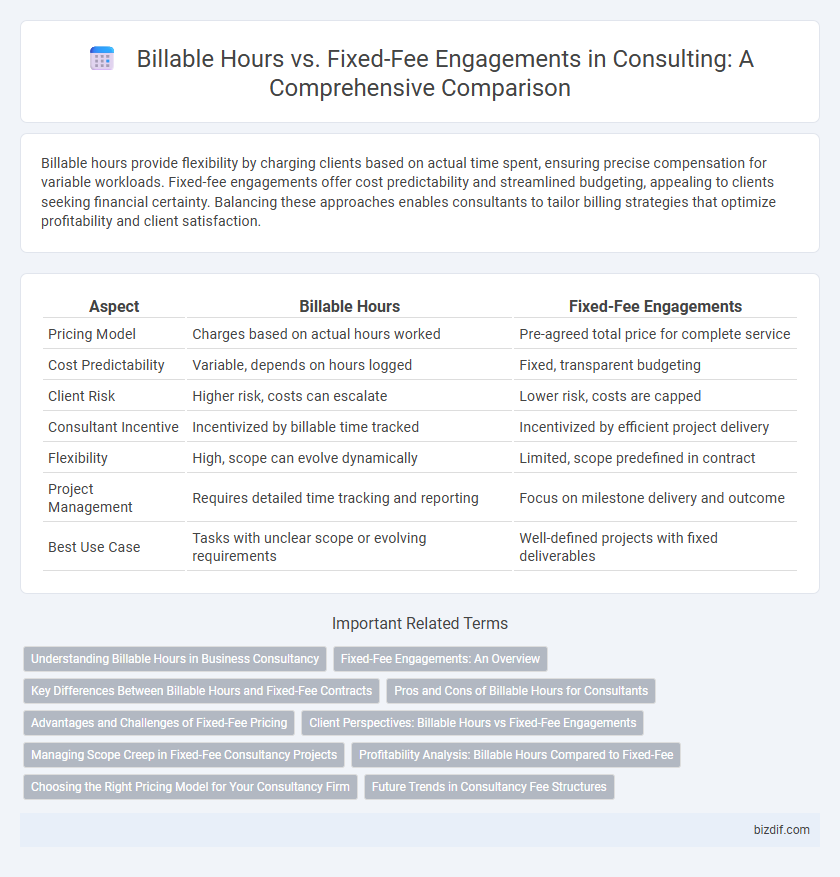Billable hours provide flexibility by charging clients based on actual time spent, ensuring precise compensation for variable workloads. Fixed-fee engagements offer cost predictability and streamlined budgeting, appealing to clients seeking financial certainty. Balancing these approaches enables consultants to tailor billing strategies that optimize profitability and client satisfaction.
Table of Comparison
| Aspect | Billable Hours | Fixed-Fee Engagements |
|---|---|---|
| Pricing Model | Charges based on actual hours worked | Pre-agreed total price for complete service |
| Cost Predictability | Variable, depends on hours logged | Fixed, transparent budgeting |
| Client Risk | Higher risk, costs can escalate | Lower risk, costs are capped |
| Consultant Incentive | Incentivized by billable time tracked | Incentivized by efficient project delivery |
| Flexibility | High, scope can evolve dynamically | Limited, scope predefined in contract |
| Project Management | Requires detailed time tracking and reporting | Focus on milestone delivery and outcome |
| Best Use Case | Tasks with unclear scope or evolving requirements | Well-defined projects with fixed deliverables |
Understanding Billable Hours in Business Consultancy
Billable hours in business consultancy refer to the actual time consultants spend working on client projects, which are charged at an agreed hourly rate. This model allows precise tracking of service delivery and ensures clients pay strictly for the consultant's time and expertise. Monitoring billable hours helps consultancy firms optimize resource allocation and improve profitability by aligning efforts with client needs.
Fixed-Fee Engagements: An Overview
Fixed-fee engagements in consultancy offer a predetermined price for defined services, allowing clients to budget with certainty and consultants to streamline project scope management. This pricing model incentivizes efficiency and clear deliverable milestones, reducing the complexities often associated with tracking billable hours. By emphasizing outcome-based results, fixed-fee engagements foster stronger client-consultant alignment and mitigate the risks of project overruns.
Key Differences Between Billable Hours and Fixed-Fee Contracts
Billable hours contracts charge clients based on the actual time consultants spend on projects, promoting flexibility but leading to potential budget unpredictability. Fixed-fee engagements offer a predetermined price for a defined scope, providing cost certainty but requiring precise project planning to avoid scope creep. Understanding these key differences helps consultancy firms select the optimal billing model aligned with client expectations and project complexity.
Pros and Cons of Billable Hours for Consultants
Billable hours offer consultants precise compensation aligned with actual time spent, promoting transparency and flexibility in project scope adjustments. However, reliance on billable hours may lead to inefficiencies, as consultants might prioritize extended hours over outcomes, potentially straining client relationships. The model lacks cost predictability for clients, which can deter long-term engagements despite fostering accountability for time management.
Advantages and Challenges of Fixed-Fee Pricing
Fixed-fee engagements provide clients with predictable costs and reduce billing disputes, enhancing trust and satisfaction in consultancy services. Consultants face challenges in accurately estimating project scope and resource allocation, which can impact profitability if unexpected complexities arise. Effective fixed-fee pricing demands thorough project planning and risk management to maintain financial viability while delivering agreed-upon outcomes.
Client Perspectives: Billable Hours vs Fixed-Fee Engagements
Clients often prefer fixed-fee engagements for predictable budgeting and cost control, reducing anxiety over escalating expenses common in billable hours models. Billable hours provide transparency on time spent but can lead to client concerns about efficiency and potential overcharging. Clear communication about project scope and expectations is essential to balance value perception between these billing methods.
Managing Scope Creep in Fixed-Fee Consultancy Projects
Managing scope creep in fixed-fee consultancy projects requires clear definition of deliverables and stringent change control processes to prevent budget overruns. Establishing detailed project scope documentation and frequent client communication ensures expectations are aligned and additional work is formally approved. Utilizing time-tracking tools alongside milestone-based payment schedules helps consultants maintain profitability while avoiding the risks commonly associated with unlimited scope expansions.
Profitability Analysis: Billable Hours Compared to Fixed-Fee
Analyzing profitability between billable hours and fixed-fee engagements reveals that billable hours provide flexibility in revenue aligned with actual work, enhancing profit margins during high demand periods. Fixed-fee projects offer predictable income and streamlined billing but risk reduced profitability if scope expansion occurs without corresponding fee adjustments. Consulting firms must evaluate utilization rates, project complexity, and risk management to optimize profit outcomes under each billing model.
Choosing the Right Pricing Model for Your Consultancy Firm
Selecting the right pricing model for your consultancy firm depends on project scope, client preferences, and risk tolerance. Billable hours offer flexibility and detailed tracking for variable workloads, enhancing transparency and aligning fees with effort. Fixed-fee engagements provide predictable costs, incentivize efficiency, and simplify budgeting for both consultants and clients.
Future Trends in Consultancy Fee Structures
Future trends in consultancy fee structures indicate a growing shift from traditional billable hours to fixed-fee engagements, driven by client demand for cost predictability and transparent pricing. Advanced data analytics and AI-powered project management tools enable consultants to more accurately estimate project scopes and deliverables, facilitating fixed-fee agreements. Emerging hybrid models combining elements of both fee structures are also gaining traction, optimizing profitability while aligning incentives between consultants and clients.
Billable Hours vs Fixed-Fee Engagements Infographic

 bizdif.com
bizdif.com